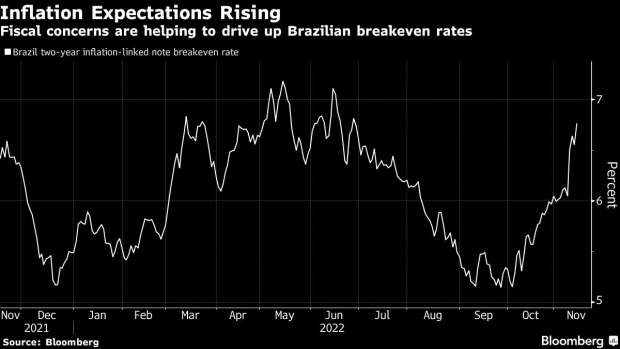Nov 17, 2022
Fear That Lula Might Reignite Inflation Is Hurting Brazilian Assets
, Bloomberg News

(Bloomberg) -- Renewed worries about the risk of skyrocketing inflation appear to be at the heart of investors’ concerns about Brazilian assets, which have been smacked after President-elect Luiz Inacio Lula da Silva unveiled some of his plans for the economy.
The so-called breakeven rate on two-year inflation-linked notes, a measure of traders’ expectations for the average pace of consumer-price gains over that timeframe, have ballooned by more than 1.6 percentage points since early October to around 6.77%. That’s a period that encompasses the final stretches of Brazil’s presidential election, when it became more apparent that Lula was likely to defeat incumbent Jair Bolsonaro, and the aftermath of the vote.
As a leftist there was, of course, always an expectation during the campaign that Lula would lean more toward the idea of increased social outlays than his rival. But since narrowly defeating Bolsanaro on Oct. 30, Lula’s rhetoric has shifted more overtly from fiscal responsibility toward more spending, or “social responsibility” in the incoming leader’s own words.
For some investors, that suggests echoes of the situation under former President Dilma Rousseff, who took the reins from Lula after his first stint in office. She was in charge in the volatile 2014-15 period when inflation spiked beyond 10% and the economy contracted.
Rapid inflation has been a major concern for the country in the past couple of years too, with runaway price gains prompting Brazil’s central bank to raise interest rates throughout much of 2021 and 2022. That put it in the vanguard of global central banks in seeking to tackle inflation with tighter monetary policy and a recent easing of price pressures appeared to have given policymakers some respite from having to increase rates further. Whether that holds true in the wake of increased government spending, though, remains to be seen.
The anticipation of more inflation has caused swap rates and yields of local bonds to jump on expectations the central bank will need to keep its benchmark rate high for longer. The short-end of the curve, which less than two weeks ago implied that monetary officials might actually cut rates as soon as March, has now erased the possibility of a reduction in borrowing costs next year.
Higher rates directly impact the multiples of Ibovespa stocks, and the benchmark Brazilian equity index has dropped almost 8% since the election.
The Brazilian real, meanwhile, is caught in something of a tug-of-war. While higher rates potentially make it an attractive destination for traders seeking better carry, increased foreboding about the fiscal situation and inflationary impacts has the potential to deter foreign capital from the country. The currency was the second-wort performer Thursday among emerging market peers, dropping around 1.3% against the dollar.
Lula’s transition team, in its first act, proposed a fiscal waiver for the government to spend up to 200 billion reais ($36.5 billion) more during the next few years, independent of the impact it may cause to the nation’s debt-to-gross domestic product ratio. Lula said the “dollar will rise, stocks will fall, so be it.”
Any drop in swap rates “is now on hold for a while,” said Mario Castro, a fixed-income strategist at BBVA. “The problem here is the signaling that the new government is providing to the markets. It is breaking the trust before starting.”
--With assistance from Felipe Saturnino.
©2022 Bloomberg L.P.








